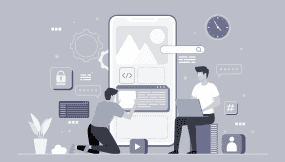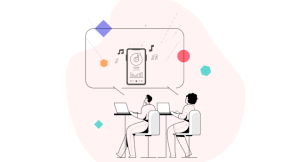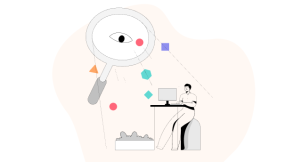The growing number of digital health services has made it necessary for hospitals and medical centers to develop modern, convenient, and robust solutions.
mHealth solutions provide easy access to medical records, appointment bookings and scheduling, check-ups, laboratory results, doctor consultations, medication reminders, insurance claims, and more, helping hospitals provide better quality care by optimizing the workflow process.
Read on if you want to learn how to build an app for a hospital that complies with industry-specific regulations and contributes to the efficiency of your healthcare organization.
8 Types of Mobile Apps for Hospitals
Hospital apps vary in purposes and features. While some are designed to be used by hospital personnel, others may be more useful for patients. Let’s explore some common types of mobile apps and software and how they could benefit hospitals.
1. Patient data and record management apps
These apps help healthcare providers quickly access patient records, manage appointments, track medical history, and more. Not only do these apps make it easier for healthcare providers to stay organized, but they also enable patients to have better control over their medical information. Patients can easily access their medical records from anywhere in the world via a patient gateway with just a few taps on a mobile phone or computer. This helps them stay up-to-date with their treatment plans and ensures that they always receive the best care possible.
2. Patient satisfaction and feedback apps
These apps enable patients to provide feedback on the quality of care they receive, giving healthcare providers valuable insights into what works and what doesn’t. Using these apps, healthcare facilities can quickly identify areas where they need to make improvements or changes in order to enhance the quality of care for their patients. Ultimately, with the help of these apps, healthcare providers can ensure that their patients have the best possible experience during their visit to the medical facility.
3. Remote health monitoring systems
Remote health monitoring systems are making a significant impact on the way healthcare is delivered. By using these systems, doctors can track the health of their patients from any location, enabling them to provide better care and reduce hospital visits. Remote health monitoring systems also allow for more accurate diagnosis and real-time feedback from the doctor. Moreover, it can help patients better control their health by providing access to medical information and advice at home or wherever they may be. With these systems in place, healthcare providers can offer enhanced services that make it easier for both doctors and patients to manage their own well-being.
4. Virtual nursing apps
These apps enable nurses and other medical professionals to monitor patient health quickly and accurately from almost anywhere. It can also help reduce costs associated with in-person visits by reducing travel time and allowing for more efficient communication between doctors. With features such as telemedicine, videoconferencing, electronic health records, and patient portals, virtual nursing software can provide a comprehensive view of a patient’s health that is not only convenient but also cost-effective.
5. Telemedicine platforms
A telemedicine platform is accessed by both the patient and the doctor, thus making it possible for them to communicate and exchange data securely. A patient can access medical advice, diagnosis, and treatments without attending a clinic or hospital in person. Similarly, doctors can deliver timely diagnoses and treatments without having to travel long distances. This platform is ideal for rural areas where access to quality healthcare is often limited due to geographical constraints.
6. Health management platforms and apps
These platforms and apps can help patients track their health metrics, set goals, and get personalized advice from health professionals. Using these tools, they can easily take control of their wellness and have a healthier lifestyle. They can also help healthcare providers provide better patient care by ensuring access to previously unavailable data. With the increased use of such platforms and apps, healthcare is becoming more accessible and efficient for everyone involved.
7. Chronic illness management apps
These apps serve as personal digital assistants for those with chronic diseases, helping them manage their conditions. The features of these apps vary, but they typically allow users to track their symptoms, schedule appointments and reminders for medication, store vital medical information, access support groups and resources and even connect with healthcare professionals. Through the use of AI-powered analytics and data visualization tools, these apps can also help users gain insight into their condition over time.
8. Prescription information and order management
With the right technology in place, it can help streamline the administrative workload and cooperation with prescription vendors, as well as ensure improved patient safety. The use of automation and AI-driven technologies can help reduce errors and optimize how prescription information is handled. It can also make drug ordering more efficient by providing real-time information about availability, cost, and other factors. This will ultimately lead to better patient care outcomes.
Do you want to create a custom HIPAA-ready hospital solution?
We know how to make a hospital app with powerful features to satisfy your patients and medical staff.
Contact usKey Features of Hospital Applications
Before building an app for a hospital, it is essential to know what hospital app features you want it to have in order to provide the best possible services to patients. Some of the most popular features of a healthcare app are the following:
1. Medical appointment management
Gone are the days when we needed to make calls in order to schedule an appointment. The ability to book a visit to a hospital with a few taps on your smartphone is convenient for patients and hospital staff.
2. Prescription management
This functionality eliminates the need for paper prescriptions, thus making the process faster, more accurate, and safer for both the patient and the practitioner. Additionally, it increases patient safety by reducing medication errors resulting from handwritten prescriptions.
3. Dashboards
Dashboards help medical staff keep track of patient data and provide quick access to information about the patient’s medical history. Additionally, they can be used to monitor medical personnel and equipment performance. Dashboards enable hospitals to streamline operations and make data-driven decisions with the help of real-time analysis.
4. Doctor, nurse, and patient profiles
In-depth doctor, nurse, and patient profiles in hospital apps can provide a more personalized healthcare experience and enable better communication between healthcare providers and patients. By having access to detailed information about the patient’s medical history, doctors and nurses can make better decisions about treatment plans.
Technologies Used in Hospital Application Development
Hospital app development is a highly specialized field that requires the use of multiple tools and technologies to build robust and secure applications. These are only some of the tools that power apps for healthcare organizations:
1. Cloud solutions
Cloud solutions provide hospitals with a secure, cost-effective way to store and manage patient data and other important information. They help hospitals ensure better patient experiences by providing more efficient services such as appointment scheduling and billing.
2. Internet of things
IoT-enabled hospital apps are developed to give real-time access to medical data and patient-centric services. Furthermore, IoT technology can help hospitals track the location of medical equipment and personnel, monitor vital signs, predict disease outbreaks, and track medication administration and records, among other use cases.
3. Big data & analytics
By leveraging the power of big data, hospitals can better understand patient needs, predict health issues, and provide more tailored care. With big data and analytics, hospital apps can be designed to be more intuitive and user-friendly for both patients and the providers of healthcare services.
4. Payment systems
Integration of payment gateways enables patients to pay for medical services with a few taps on a smartphone. Patients can also easily access their bills, pay for services, and manage their appointments.
5. Artificial intelligence
AI empowers medical app users with improved diagnosis accuracy, automated pre-diagnosis processes, enhanced patient engagement through chatbots, personalized treatment plans tailored to individual needs, improved patient monitoring systems, and more.
Create a custom HIPAA-ready hospital app
Our professional team will help you bring your idea to life.
Contact usChallenges in Hospital App Development
Developing a hospital app is no easy feat. Not only do you need to design a secure and reliable platform that meets the particular needs of hospitals, but you also need to address various challenges during the development process. Let’s see the most common issues that may arise when creating a hospital app:
1. Handling big data
Big data has the potential to revolutionize healthcare. Still, developers must be aware of the challenges they may face in handling it. Common challenges associated with big data in hospital app development are storage capacity restrictions, lack of modern analytics tools, and insufficient security measures.
2. Integration with existing hospital systems
In most cases, a newly designed mHealth digital product must be integrated with existing hospital software or platform. Failure to integrate a new app with an existing system may compromise patient care and create problems in hospital workflows.
3. Patient data security
Hospital app development can be a challenging process due to the complexity of the medical data and the requirements of healthcare authorities. This is why it is essential to ensure that these apps are secure, have a good user experience, and comply with relevant regulations.
Cost of Building a Hospital App
When considering medical app development for hospitals, learn about the cost of resources, development hours, and other factors.
To build a custom solution from scratch (not just implement a mHealth API), you will need a team of UI/UX designers, QA engineers, a project manager, and of course, iOS/Android developers, and backend developers who know how to create an app for hospitals. Depending on the complexity of the project, hospital application development costs usually vary from $20,000 to $150,000.
Having trouble estimating the budget for your healthcare solution?
Weelorum experts will tell you how much it’ll cost to create a hospital application that will meet your needs.
Contact usConsider Weelorum Your Trusted Partner
Weelorum provides app development services for healthcare organizations. With vast experience in app development for hospitals, our professionals have the expertise in building powerful custom apps from scratch and integrating them with existing systems into a unified whole.
We know how to create a hospital app that facilitates the patient experience, eases the administrative burden on hospital staff, and complies with industry regulations. Contact us, and we will help you create a top-notch solution for your healthcare organization.
FAQ
What is a hospital app?
A hospital app is a mobile application that offers patients convenient access to their medical records and healthcare information. It may allow them to book appointments, view test results, communicate with their doctors, and manage medications. They provide patients with an easy and secure way to stay up-to-date on their health needs.
How do I build a hospital app?
To develop a quality hospital app, healthcare providers often hire outsourced development teams. Together with tech specialists, they consider a variety of factors, such as the functionality and usability of the app, security measures, data protection standards, and compatibility with existing systems. Contact Weelorum professionals who know how to make an app for hospitals and get help in creating a top-notch healthcare solution.
What is the cost of a hospital app development?
The cost of application development for hospitals depends on various factors, such as the app's complexity, the platform it is designed for, and the features it contains. On average, the prices range from $20,000 to $150,000. You can always contact Weelorum and request a quote for a custom healthcare app for your organization.




